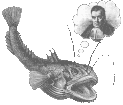UW Aquatic & Fishery Sciences Quantitative Seminar
Lise Comte
School of Aquatic & Fishery Sciences; University of Washington
Adapt, move, or die: which future for freshwater fishes under climate change?
Abstract
As climate changes across already heavily altered ecosystems, there is no doubt that species will be affected, but to what extent and which will be most vulnerable is still uncertain. Essentially, species have three main alternatives, either stay put and adapt, move to track shifting climates, or die. In this context, the degree to which species retain their niches and related ecological traits through space and time (‘niche conservatism’) is critical to understand species’ responses to climate change. Freshwater fish are though to be particularly vulnerable because of their ectothermic physiology and constrained distribution within hydrographic networks – yet their capacity to cope with climate warming remains largely unknown. We are currently investigating the degree of niche conservatism of freshwater fish species through time (over the recent decades), space (between native and non-native ranges) and evolutionary history (along the phylogeny). This research aims to advance knowledge of the extent to which niche stasis contributes to species’ vulnerability under global environmental change.

